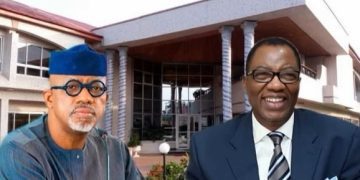With Nigeria’s whopping 18.3 million out-of-school children figure not showing signs of dropping rapidly soon, an international charity has initiated fresh moves to tackle the crisis decisively.
The Ibironke Adeagbo Foundation (IAF), based in the UK, has thrown its hat in the ring to rescue education in Nigeria, the most populous Commonwealth – member black nation in Africa.
IA-Foundation has been a key player in the effort to tackle the worrisome out-of-school crisis in Nigeria, where UNICEF and UNESCO have reeled out high figures of out-of-school children from year to year.
The Founder of IA-Foundation, Mrs Ibironke Adeagbo, has announced the resolve by the charity to tackle the problem, saying the initiative is to support the Renewed Hope Agenda of the Federal Government.
Adeagbo spoke with newsmen today in Lagos, while announcing latest plans by the foundation to assist Nigeria
She said that the foundation was working currently on what she described as a “roadmap”, to be unveiled by the foundation in a few days, to tackle the out-of-school problem, to salvage early child education in Nigeria.
According to her, the foundation has come out in full force, to help the Federal Government to turn the page in the crisis plaguing education in Nigeria.
“With over 18 million children out of school, Nigeria’s education landscape faces an unprecedented crisis.
“The nation’s economic and social future depends on our collective commitment to quality education,’’ the British-born Nigerian, who resides in London said.
She pointed out that Nigeria’s education system was at a critical juncture, grappling with severe challenges, including inadequate infrastructure and chronic under-funding.
“IA-Foundation is committed to driving actionable solutions at this point in time because we must secure a brighter future for our out-of-school children and Nigeria education at large.
“Education is the cornerstone of development and progress,” Adeagbo added.
Adeagbo disclosed that an international summit on education had been slated for Lagos later this month, because “we cannot afford to overlook the urgent needs of our education sector.
She said that the summit, tagged: “Street to School: A Tech-Based Solution, is to address Nigeria’s Education Crisis. The summit would ignite critical discussions that would lead to substantial and measurable changes in the education sector. High profile speakers are expected at the summit. This will be followed by an awareness walk from Falomo underbridge.
The summit is expected to be a eye opener for the proposed summit on out of school children which the Senate agreed to hold.
Adeagbo restated her call for the Federal Government to increase budgetary allocation to the education sector in line with UNESCO’s recommendation of allocating 15 to 20 per cent of total public expenditure to education.
She also called for strengthening of partnerships with civil society groups to fund educational initiatives, aimed at tackling various problems in the education sector, especially the out-of-school challenge.
Adeagbo said that Nigeria should implement initiatives targeted specifically at marginalised groups, including girls, children with disabilities and those from low-income families.
The IAF founder stressed the need for the government to utilize technology to boost learning opportunities, especially in remote communities and unserved areas.
Adeagbo said that Nigeria should also pay priority attention to training of teachers to equip them with skills to deliver quality education.
“We believe that Nigeria can establish a sustainable and inclusive educational framework that will leave no child behind,’’ she stated.
IA-Foundation has been campaigning over the years to tackle the out-of-school crisis, which has seen millions of kids forced out of school in the most populous country in Africa.
The problem of insecurity, caused by terrorism, banditry, militancy and other anti-social ills, plaguing Nigeria in recent years has forced many children out of school in Nigeria in recent years.
But Nigerian troops have been fighting back to stamp out terrorism and other problems, to allow children to have unrestricted access to classrooms. (Ends)







































